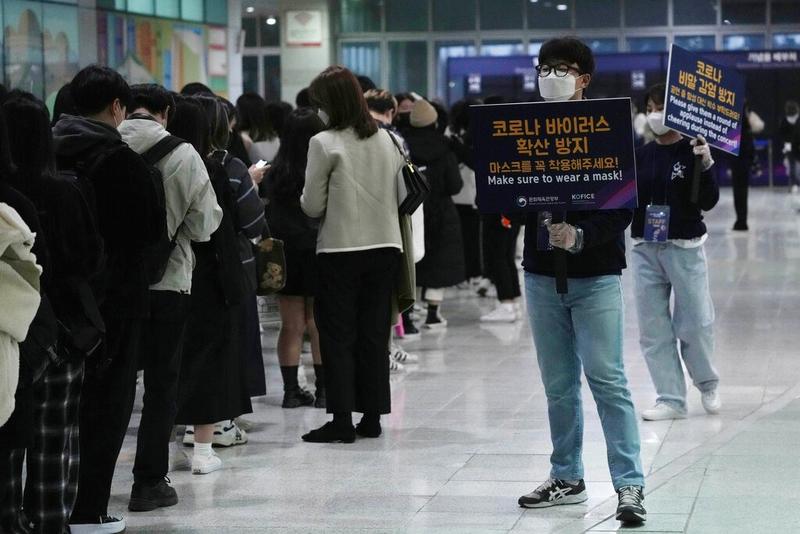 Guides hold notices about precautions against the coronavirus as people wait to watch the 2021 World K-Pop Concert at the KINTEX convention center in Goyang, South Korea on Nov 14, 2021. (AHN YOUNG-HOON / AP)
Guides hold notices about precautions against the coronavirus as people wait to watch the 2021 World K-Pop Concert at the KINTEX convention center in Goyang, South Korea on Nov 14, 2021. (AHN YOUNG-HOON / AP)
NEW DELHI / YANGON / TOKYO / TEHRAN / ANKARA / WELLINGTON / RAMALLAH / SEOUL / MANILA / ULAN BATOR / CANBERRA - South Korea registered a total of 35,620 breakthrough COVID-19 infections, which refer to the fully vaccinated people who were infected with the virus, the health authorities said Tuesday.
The number of those who were infected with the COVID-19 two weeks after the full vaccination stood at 35,620 as of Nov 7, up from 28,293 a week earlier, according to the Korea Disease Control and Prevention Agency (KDCA).
It equals to 99.2 in every 100,000 people who got fully vaccinated. As of Nov 7, the number of the fully inoculated people was 35,907,789.
It is known that people can be protected from the virus two weeks after the fully vaccination.
By age group, the number marked the highest among those aged 80 or higher, whose breakthrough cases reached 183.4 in every 100,000 fully-inoculated people.
In the latest tally, the country reported 2,125 more cases of COVID-19 for the past 24 hours, lifting the total number of infections to 399,591. The daily caseload stayed above 2,000 for seven days.
In another development, Britain’s ambassador to South Korea has joined a growing number of foreigners and entertainment business owners criticizing the country for not recognizing vaccinations completed abroad.
Ambassador Simon Smith, in a Twitter post, called on the Korean government to stop discriminating against foreigners who aren’t able to obtain a vaccine pass because the government won’t recognize vaccinations taken outside Korea.
The pass is required to enter what it deems “highly risky areas” such as gyms, spas, nightclubs and sporting events.
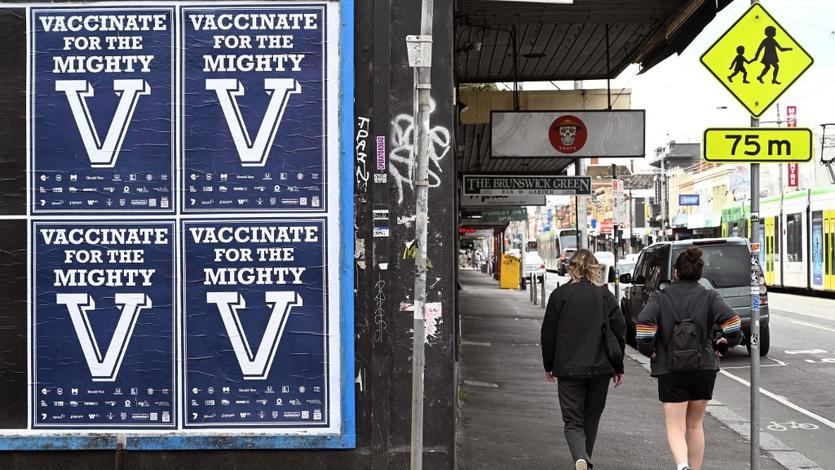 People walk past a sign encouraging people to get vaccinated in Melbourne on Aug 31, 2021 as the city experiences its sixth lockdown as it battles an outbreak of the Delta variant of coronavirus. (WILLIAM WEST / AFP)
People walk past a sign encouraging people to get vaccinated in Melbourne on Aug 31, 2021 as the city experiences its sixth lockdown as it battles an outbreak of the Delta variant of coronavirus. (WILLIAM WEST / AFP)
Australia
Australia’s government may face a more than A$50 million ($37 million) bill related to its COVID-19 vaccination program, as thousands of people register for compensation for health issues related to their inoculations, the Sydney Morning Herald reported.
More than 10,000 people have registered for a government program to be compensated for lost income after being hospitalized for rare but significant side effects from the jab, the paper reported, citing official data.
Compensation starts from A$5,000, meaning the program would cost at least A$50 million should each claim be approved.
Australia’s Therapeutic Goods Administration has received almost 79,000 reports of adverse side effect from 36.8 million doses of vaccine, according to its website. The most frequent reported side effects include a sore arm, headache, fever and chills.
The TGA has received 288 reports assessed as likely to be heart inflammation linked to the Pfizer Inc vaccine, as well as 160 of rare clotting disorder thrombosis with thrombocytopenia syndrome (TTS) linked to the AstraZeneca Plc vaccine.
Nine deaths have been linked to the immunization program, the overwhelming majority of whom were aged 65 years and older, according to the TGA.
Following an early setback, Australia ramped-up its vaccination push in the second half of the year as the delta variant plunged its two largest cities Sydney and Melbourne into a months-long lockdown. Restrictions have gradually eased in recent weeks as inoculation rates have surged.
In another development, parts of Australia's Northern Territory (NT) have been thrust into lockdown after COVID-19 was found in a remote Indigenous community.
Michael Gunner, chief minister of the NT, announced on Monday evening that the communities of Greater Katherine and Robinson River would be locked down for 72 hours after two people tested positive for COVID-19.
Gunner said the situation was "undoubtedly the most serious" COVID-19 threat in the NT since the start of the pandemic.
On Tuesday, the NT health department recorded nine new cases of COVID-19, bringing the total number of cases in the current outbreak to 11.
The lockdown has been extended for the Municipality of Katherine (including Tindal) and Robinson River (including the surrounding homelands) until 6:00 pm local time on Monday, Nov 22.
India
Serum Institute of India is likely to start supplying its Covishield vaccine to the WHO sharing COVAX facility this week, the Economic Times reported, citing people familiar with the development.
The company is expected to supply 25 million doses until the end of December, the newspaper said.
India's COVID-19 tally rose to 34,456,401 on Tuesday, as 8,865 new cases were registered during the past 24 hours across the country, showed the federal health ministry's latest data.
The number of new cases registered in a day is the lowest in 287 days.
Besides, 197 deaths from the pandemic have been reported since Monday morning, taking the total death toll to 463,852.
ALSO READ: Lancet study: India's Covaxin COVID-19 shot 77.8% effective
Iran
Iran's Health Ministry on Monday reported 7,494 new COVID-19 cases, taking the country's total infection to 6,045,212.
The pandemic also claimed 105 lives in the past 24 hours, taking the overall tally to 128,272, Iran's Ministry of Health and Medical Education said in an update.
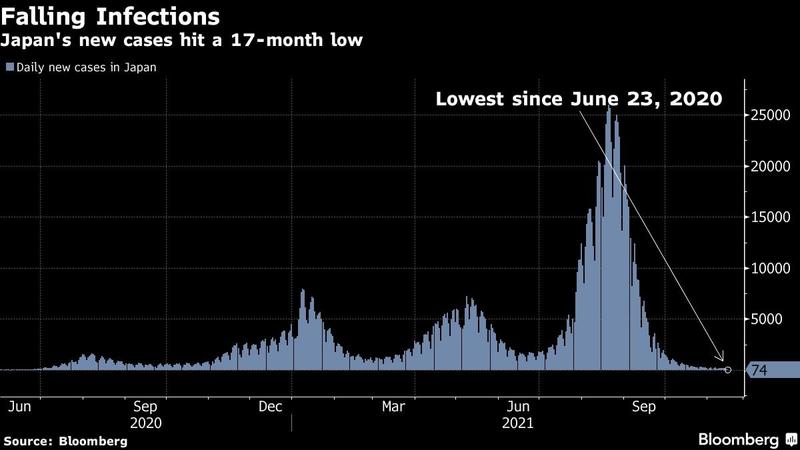 Japan
Japan
Japan reported 79 new cases of COVID-19 on Monday, the lowest figure in nearly a year and a half, as the country’s robust vaccination rate is quelling infections even in the midst of reopening the world’s third-largest economy.
The country reported one death on Monday. Tokyo, its most populous city, had just 7 new cases, according to local officials. The total number of new cases country-wide is the lowest since June 23, 2020, when the first wave of COVID-19 was brought to heel.
The number of daily cases in Japan has plunged from a peak of about 25,000 during the summer, while vaccinations have surged so much that it’s now one of the most immunized developed countries in the world.
The rising levels of protection allowed the government to start lifting restrictions on bars, restaurants and entertainment venues in October for areas that make up 75 percent of the economy.
The country is now considered a low-risk destination for American travelers after it was moved on Monday to the lowest rung of the US Center for Disease Control and Prevention’s COVID-19 travel advisory level.
Meanwhile, a panel of the Japanese health ministry on Monday approved administering booster shots of the COVID-19 vaccine from Dec 1 in the country.
The Pfizer-BioNTech COVID-19 vaccine will initially be the only one used for the third doses.
Individuals to receive the booster shot will in principle need to wait eight months after their second dose, the health ministry panel said.
However, local governments are allowed to shorten the interval to six months if they consider it necessary, for example to contain an ongoing surge in infections.
People aged 18 and over will also be eligible for the booster shots which are particularly recommended to people living with pre-existing conditions or working in high-risk occupations.
Mongolia
Mongolia's COVID-19 tally rose to 375,285 on Tuesday after 753 new local infections were confirmed in the past 24 hours, according to the country's health ministry.
In addition, the country's COVID-19 death toll increased to 1,826 after 11 more patients aged over 40 died in the past day.
Myanmar
Myanmar reported 700 new COVID-19 cases with 3.35 percent of daily test positivity rate in the past 24 hours, according to a release from the Ministry of Health on Monday.
The number of total COVID-19 infections in Myanmar has increased to 513,962 while the death toll was recorded at 18,946 after 17 new deaths were reported on Monday.
ALSO READ: Aussies aim to inoculate children under 12 against COVID-19
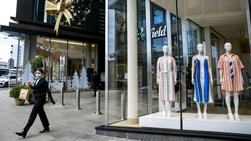 People return to shopping at Newmarket in Auckland, New Zealand as some COVID-19 restrictions were eased on Nov 10, 2021. (ALEX BURTON / NEW ZEALAND HERALD VIA AP)d via AP)
People return to shopping at Newmarket in Auckland, New Zealand as some COVID-19 restrictions were eased on Nov 10, 2021. (ALEX BURTON / NEW ZEALAND HERALD VIA AP)d via AP)
New Zealand
New Zealanders who are fully vaccinated will now spend less time isolating if they get COVID-19 or are a close contact of a case, a senior health official said on Tuesday.
The isolation period for fully vaccinated COVID-19 cases in the community has been reduced from 14 days to 10 days, and must include 72 hours symptom-free, Associate Health Minister Ayesha Verrall said in a statement.
The isolation period for partially vaccinated or unvaccinated COVID-19 cases will remain 14 days, including 72 hours symptom-free, Verrall said.
"If you are vaccinated and catch COVID-19, by day 10 of infection you will pose a very low risk of passing on the virus -- and do not need to isolate for as long as someone who's unvaccinated," she said.
That's because the amount of viral, genetic material declines faster in fully vaccinated people, she explained.
Palestine
The Palestinian government on Monday approved the recommendations of the health ministry to administer the COVID-19 vaccine to those aged 12 to 15, according to an official statement.
According to the statement, the Palestinian government also agreed to start administering a third jab to Palestinians aged over 18 and who had already received the first and second jabs at least six months ago.
The Palestinian Ministry of Health said in a statement that "there is a decrease in the number of infections with COVID-19 due to vaccinations for most groups of society."
Seven fatalities and 236 new COVID-19 cases were recorded in the West Bank and Gaza Strip in the last 24 hours, according to the ministry's daily COVID-19 report.
Philippines
Philippine health workers can get booster shots starting Wednesday, the Health Department said. The agency recommended COVID-19 vaccines from Moderna, Pfizer and Sinovac as boosters. Over a third of the population has been fully vaccinated.
Philippine President Rodrigo Duterte said late Monday that face shields will no longer be required in many places, easing the mandate more than a year after becoming one of the few countries in the world to require the plastic barriers against COVID-19.
Face shields will only be mandatory where there’s a strict lockdown, according to a memorandum from Duterte’s office. Wearing them has been “cumbersome,” Duterte said.
The department reported 849 new coronavirus disease (COVID-19) infections on Tuesday, pushing the number of confirmed cases in the Southeast Asian country to 2,819,341.
Tuesday's caseload is the lowest daily figure since December 28 last year. The department said that the low caseload "is largely due to weekly dip of testing output."
The country also reported that 99 more people died from COVID-19 complications, bringing the country's death toll to 45,808.
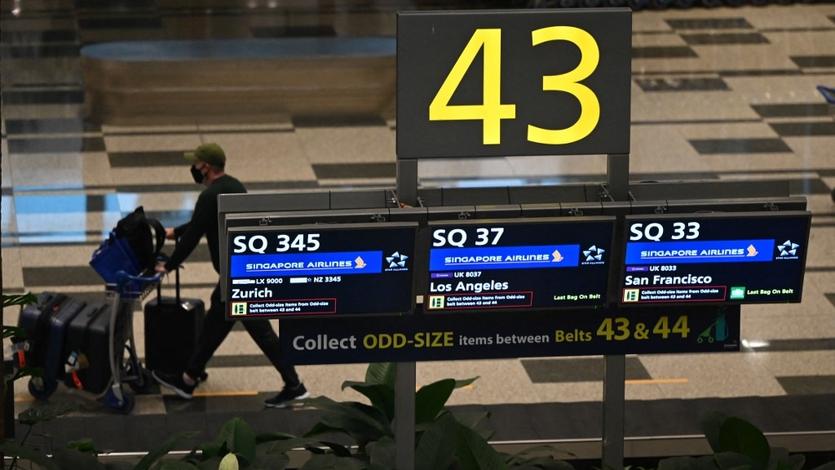 A passenger on Singapore Airlines flight arrives, under the Vaccinated Travel Lane (VTL), at Changi Airport in Singapore on Oct 19, 2021. (ROSLAN RAHMAN / AFP)
A passenger on Singapore Airlines flight arrives, under the Vaccinated Travel Lane (VTL), at Changi Airport in Singapore on Oct 19, 2021. (ROSLAN RAHMAN / AFP)
Singapore
Singapore has begun the arduous task of reestablishing itself as Asia’s international aviation hub, throwing its borders open to five more countries as it presses on with plans to reopen and live with COVID-10.
The city-state will allow quarantine-free travel for fully-vaccinated people from countries including India, Indonesia and Saudi Arabia it said Monday as it looks to safely move past the pandemic that has kept its 5.7 million residents home for more than a year.
Inoculated visitors from Indonesia and India will be able to enter Singapore from Nov 29, while those from Saudi Arabia, United Arab Emirates and Qatar will be welcome from Dec 6 without having to quarantine, the Ministry of Health said in a statement Monday. Unvaccinated children age 12 and under can accompany eligible adults.
Singapore plans to start the arrangement with Indonesia with two designated flights between Singapore and Jakarta everyday, and will increase that to four, Transport Minister S. Iswaran said. It’s aiming for two daily flights each to Chennai, Delhi and Mumbai, he said.
Both countries were among the top five markets for passenger arrivals at Singapore’s Changi Airport in 2019.
The southeast Asian nation started gradually reopening its borders to general travel in September when it kicked off a vaccinated travel lane with Germany and Brunei.
The city-state, home to the world’s best airport for eight years until 2020, has ditched its COVID-Zero policy and pivoted to an approach of living with the virus.
Currently, there are 13 countries, including the US, Canada and Italy, under the Vaccinated Travel Lanes (VTL) program. Malaysia, Finland and Sweden will join the list on Nov 29. Details on the travel arrangement with Malaysia will be available later this week.
The daily quota for those arriving in Singapore under the VTL program will increase to 10,000 when the latest countries are added to the list, from 6,000, according to the statement. As of Nov 14, more than 24,000 vaccinated travelers have entered Singapore under these arrangements.
With 85 percent of its population fully inoculated, the country is trying to tread a path of reopening to rebuild its status as a hub and keeping a tight lid of infections that may overwhelm its health care system.
Turkey
Turkey on Monday confirmed 23,852 new COVID-19 cases, raising its tally of infections to 8,432,018, according to its Health Ministry.
The death toll from the virus in Turkey rose by 215 to 73,746, while 25.258 more people recovered in the last 24 hours.


